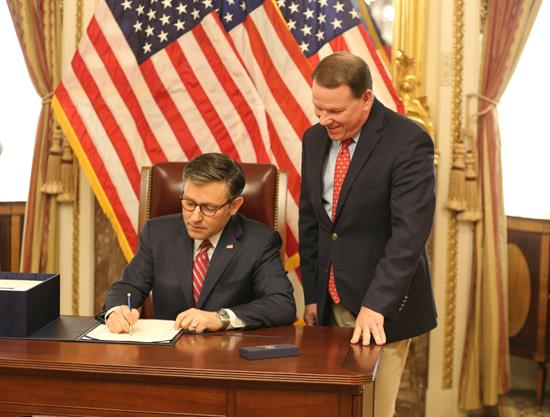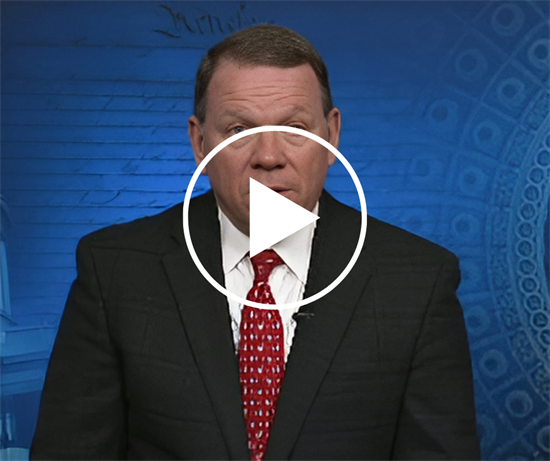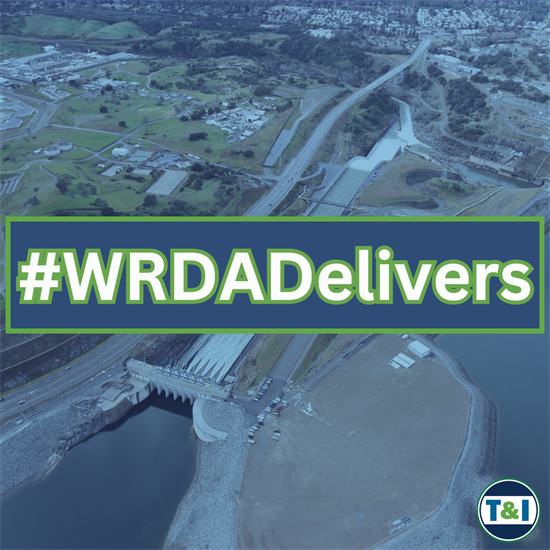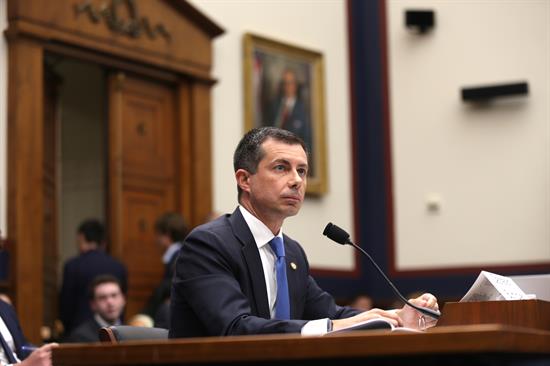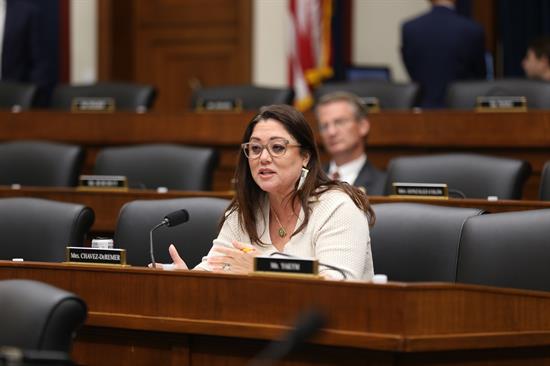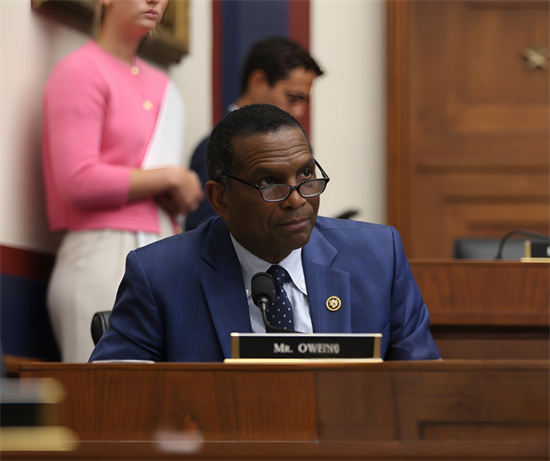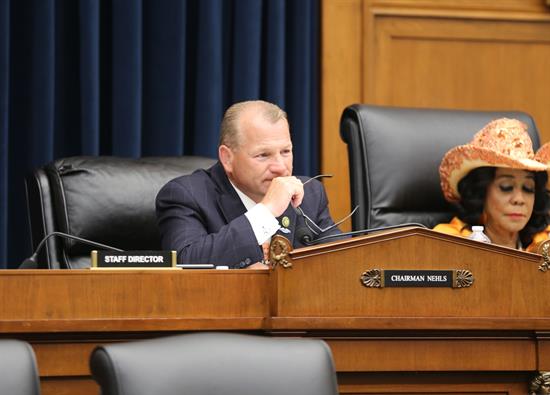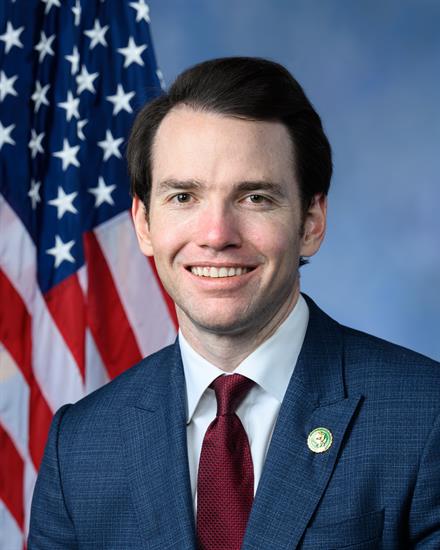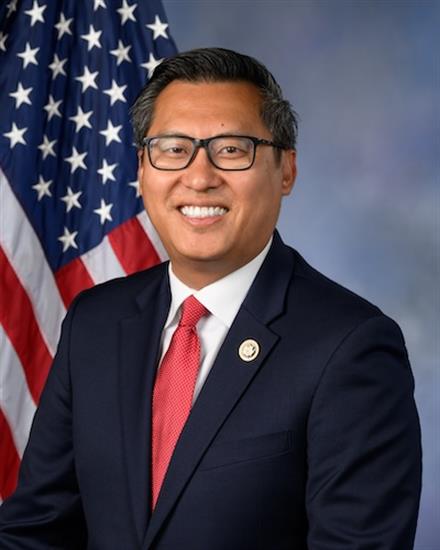
| THE RUNWAY: SUMMER RECAP |
| In this Issue: | ||||||||
|
| LANDMARK FAA BILL SIGNED INTO LAW | ||
H.R. 3935 was first introduced in the House last year by T&I Chairman Sam Graves (R-MO), T&I Ranking Member Rick Larsen (D-WA), Aviation Subcommittee Chairman Garret Graves (R-LA) and Subcommittee Ranking Member Steve Cohen (D-TN). The landmark aviation legislation provides key safety improvements, invests in infrastructure at airports of all sizes, promotes cutting-edge aviation solutions, enhances America’s aviation workforce, improves the flying public’s travel experience, and ensures a healthy general aviation sector for years to come. Prior to the bill’s being signed into law, the Committee and Subcommittee leaders sat down to highlight many of the legislation’s key provisions in this video: Upholds America’s Gold Standard in Safety America’s aviation system is safe, but the system is not immune to stress and must continually be made safer. The FAA Reauthorization Act of 2024 addresses several safety issues to ensure the United States and the FAA remain the world’s gold standard in aviation safety. Improves FAA Efficiency and Operations The law makes targeted changes to the organizational structure of the FAA to improve overall efficiency of the agency, allow for innovation, and streamline the regulatory process. These changes aim to seamlessly integrate with FAA’s ongoing efforts while simultaneously ensuring the agency is better organized to lead in an advanced aviation future. Strengthens America’s General Aviation (GA) Sector America’s aviation system would not be where it is today without a healthy GA sector, and most of all aviation professionals these days, including pilots and mechanics, get their start in GA. This law recognizes that the success of the U.S. aviation system is built upon a strong GA foundation and includes the first-ever general aviation title to secure our aviation industry’s long-term success. Grows the Aviation Workforce Our aviation system is experiencing a shortage of qualified workers, including pilots, mechanics, and air traffic controllers, and the FAA Reauthorization Act of 2024 addresses these challenges by investing in workforce development and training, removing barriers to pursuing aviation careers, improving pilot training standards, and more. Invests in U.S. Airport Infrastructure Recognizing that airports connect our communities, create jobs, and drive economic growth, the FAA Reauthorization Act of 2024 authorizes robust funding for airport infrastructure, including prioritizing investments for small and GA airports, and expediting project delivery. Encourages Aviation Innovation Various challenges, from bureaucratic hurdles to endless research, are beginning to jeopardize U.S. leadership in aviation innovation. The FAA Reauthorization Act of 2024 ensures the safe and efficient testing and integration of new technologies, such as drones and advanced air mobility (AAM), into the airspace. The law also encourages local communities to leverage the benefits of these new airspace entrants. Enhances the Passenger Experience While many parts of the aviation system typically function without incident despite its volume of travelers, one weak link in a trip can ruin a passenger’s experience. The FAA Reauthorization Act of 2024 delivers necessary reforms that will enhance the experience for the traveling public. Authorizes the National Transportation Safety Board (NTSB) As the independent federal agency responsible for investigating all civil aviation accidents, in addition to accidents in other modes of transportation, the NTSB plays an important role in transportation safety. Last authorized in 2018, this law updates the NTSB’s authorization. More information about the FAA Reauthorization Act of 2024 is available here. |
||
| WATER RESOURCES DEVELOPMENT ACT OF 2024 PASSES THE HOUSE | ||
|
On July 22nd, the Water Resources Development Act of 2024 (WRDA), was overwhelmingly approved by the House by a vote of 359 to 13. WRDA authorizes the U.S. Army Corps of Engineers (Corps) Civil Works Program for projects to improve the nation’s ports and harbors, inland waterway navigation, flood and storm protection, and other aspects of our water resources infrastructure. These are locally driven projects that also deliver regional and national benefits for strengthening the nation’s global competitiveness and supply chain, growing the economy, moving goods throughout the country, protecting communities from flooding, and more. T&I has developed and passed WRDA legislation on a bipartisan and biennial basis since 2014. “Biennial passage of the Water Resources Development Act is necessary to ensure the country’s water resources needs are addressed on a consistent basis,” said Subcommittee Chairman David Rouzer (R-NC). “This bipartisan legislative package improves our nation’s ports, harbors, and inland navigation networks while strengthening U.S. and international commerce and enhancing protection of communities during national disasters.” “WRDA delivers critical water resource infrastructure improvements for communities across America – from ports to levees to navigation channels, and more. The bill also makes policy and programmatic reforms to streamline processes, reduce cumbersome red tape, and get projects done faster,” said Chairman Sam Graves (R-MO). The Committee is working with the Senate to send a final WRDA to the president’s desk before the end of the Congress, and more information about the legislation is available here.. |
||
| HOUSE APPROVES COAST GUARD AUTHORIZATION ACT OF 2024 | ||
| The House passed bipartisan legislation to strengthen, support, and authorize funding for the United States Coast Guard, one of the nation’s six armed services, on May 14th. The Coast Guard Authorization Act of 2024 (H.R. 7659) strengthens the Coast Guard's critical missions, including safeguarding borders, ensuring maritime safety, facilitating commerce, and confronting Chinese expansion in the Pacific. “The Coast Guard Authorization Act of 2024 provides the necessary investments and authorities required to maintain the Coast Guard’s ability to carry out its critical missions,” said Subcommittee Chairman Daniel Webster (R-FL). “Those missions are wide-ranging and include ensuring the safety of maritime trade and a critical part of our supply chain, enforcing U.S. laws at sea, protecting our nation’s borders, helping counter undue Chinese influence in the Pacific, helping to develop the United States’ redefined role in the rapidly changing Arctic, and countering human trafficking and the influx of illicit drugs into the country. This bill provides the Coast Guard with the authorities and resources it needs to carry out these many critical missions.” said T&I Chairman Graves (R-MO). The bill also enhances protections against sexual assault and harassment within the Coast Guard, ensuring greater accountability and transparency. Overall, the legislation authorizes appropriations for fiscal years 2025 and 2026 to support operations and the recapitalization of the Coast Guard's cutter fleet, shoreside facilities, and IT capabilities. More information about the Coast Guard Authorization Act of 2024 is available here. |
||
| OVERSIGHT HEARING WITH SECRETARY BUTTIGIEG | ||
On June 27th, the Committee held a broad oversight hearing with Transportation Secretary Pete Buttigieg during which T&I Republicans highlighted a number of concerns. In his opening remarks, Chairman Graves noted the Department of Transportation’s slow rollout of the funds authorized by the Infrastructure Investments and Jobs Act (IIJA): “We are more than halfway through the current authorization – the Infrastructure Investment and Jobs Act (IIJA), which authorized and appropriated nearly $661 billion for the Department of Transportation. I remain concerned about the slow pace at which the Department is distributing IIJA funds…. Despite having received more than $364 billion since IIJA’s enactment, DOT has obligated a little more than half and outlaid only 27 percent of available funds.”
Several Committee Members used the hearing as an opportunity to question Secretary Buttigieg about the Administration’s support for the California high-speed rail project. Rep. John Duarte (CA-13) and Rep. Kevin Kiley (CA-03) both pressed the Secretary on the billions of taxpayer dollars that have been spent on the long-delayed and overbudget high-speed rail project. Another highly discussed topic was the Administration’s efforts to force electric vehicles (EVs) on the American public. Rep. Bruce Westerman (R-AR) raised concerns about the large amount of taxpayer funding that has been dedicated trying to force a premature fleet conversion to EVs in order to address a very small percentage of global GHG emissions. Westerman said, “If you could make every vehicle in the United States an EV overnight, you would be at less than 0.9 percent of the world’s global greenhouse gas emissions. We’re creating great turmoil and change in our country, with taxpayer dollars being spent inefficiently. I’m all for EVs, but let the technology catch up, and don’t try to ban internal combustion engines at the rate that you’re doing.” Rep. Tracey Mann (R-KS) pointed out that heavier electric batteries in EVs lead to more wear and tear on the nation’s highways compared to standard car batteries and weights, yet EV users do not pay their share into the Highway Trust Fund.
A full recap of the hearing is available here. |
||
| EFFORTS TO IMPROVE PASSENGER RAIL | ||
Prior to the June 12th hearing, Subcommittee Chairman Troy E. Nehls (R-TX) and Congressman Marc Molinaro (R-NY) introduced legislation to increase transparency and accountability at Amtrak. Rep. Nehls’ bill, the Amtrak Transparency and Accountability for Passengers and Taxpayers Act, applies the requirements of the Sunshine Act to Amtrak, including requirements for more meetings of Amtrak’s Board of Directors to be open to the public. Rep. Molinaro’s legislation, the Amtrak Executive Bonus Act, requires Amtrak to notify and brief Congress before it awards any executive bonuses and to publicly disclose any such executive bonuses awarded , along with an explanation of the metrics and criteria used to determine the bonuses. The June 12th hearing and the legislation introduced by Chairman Nehls and Rep. Molinaro are part of the Committee’s ongoing efforts to improve passenger rail and ensure that there is proper federal oversight of Amtrak. |
||
|
SUBCOMMITTEE CHECK-INS |
||
|
Aviation The Subcommittee also held a hearing for members to review current issues affecting transit ridership and revenue, assess the implementation of programs authorized in IIJA related to transit system operations, and consider lessons learned from post-pandemic transit agency operational adaptations. In addition to their recent work focused on improving safety, the Subcommittee has continued to provide crucial oversight over the federal agencies and entities under its jurisdiction. On July 9th, the Subcommittee held a hearing to examine the California Air Resources Board’s (CARB) In-Use Locomotive Regulation. |
||
|
MEET THE NEW MEMBERS |
||
Looking ahead to his work on the Committee, Kiley said, “I especially look forward to working with local and state officials to clear local bottlenecks like the I-80 and I-65 interchange that challenge riders daily. Being on this Committee means that I’ll have a front row seat to affect positive change next year when Congress must reauthorize the five-year surface transportation act.” Shortly after being sworn into the House on June 3, 2024, Rep. Vince Fong also joined his California colleague Rep. Kiley on the Committee. He also serves on the Committee on Science, Space, and Technology. Rep. Fong formerly served as a Member of the California State Assembly and served on its Transportation Committee for seven years. Upon his selection to T&I, he said, “Having served on the California Assembly Transportation Committee, I know first-hand the importance of strengthening our critical supply chain to support farmers, ranchers, and local businesses in the Central Valley, and I am eager to learn from Chairman Graves and my colleagues on the committee on commonsense solutions to benefit not just California, but our entire country.” |
||
|
IN THE NEWS |
||
|
Chairman Graves for the Washington Times: Bipartisan FAA bill is a win for the American People |
||
|
